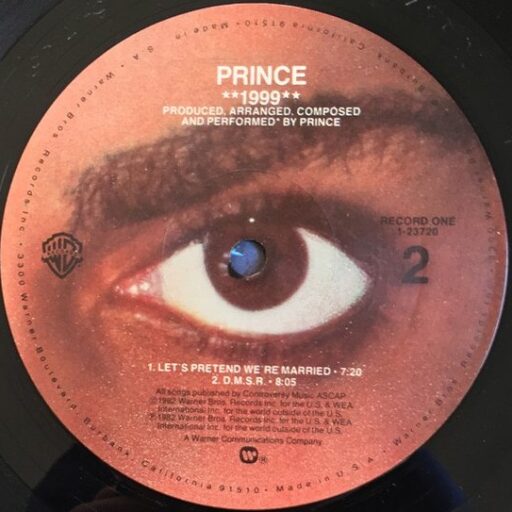Prince may have reclaimed one of his ballads from the Time’s second album, but he was at least considerate enough to leave a backup. “Gigolos Get Lonely Too,” recorded at Sunset Sound on January 11, 1982, was the first track completed for What Time is It? And, unlike its erstwhile sibling “International Lover,” it was destined for Morris Day to sing.
The concept of “Gigolos” is exactly what the title suggests: Morris–and by extension, Prince–inhabiting the role of a sex worker who longs for the intimacy to “make love without taking off my clothes.” The conceit was something of a departure from the Morris Day persona to date, which read more as an aspiring pimp than a gigolo. But then, gigolos were experiencing something of a resurgence in the early ’80s: Paul Schrader’s neo-noir American Gigolo had released to some attention in early 1980, making a star out of both leading man Richard Gere and costume designer Giorgio Armani. It’s hardly far-fetched to imagine Gere’s character, with his taste for Italian suits and the high life, influencing the Time’s visual aesthetic; certainly his refusal to engage gay clients, however unconvincing, would have helped to mitigate male sex work’s homosexual connotations.

Whatever its specific inspiration, “Gigolos” stands as one of the most effective ballads in Prince’s extended catalogue. The song builds slowly: opening with a sinuous Linn LM-1 beat, followed by a lush keyboard line that seems to melt out of the shadows. When the vocals come in, they’re tentative, almost a little shy: “I guess you’ve heard of my reputation / I’ve had my share of foolin’ around / But everybody needs stimulation / And mine just happens to be all over town.” In contrast to his showboating second take of “International Lover,” Prince’s guide vocal (a highlight of 2019’s Originals compilation) sticks largely to Day’s comfort zone–until the last line, which pushes against the limits of the fledgling singer’s upper range. Prince, naturally, sticks the landing with ease; but Day’s voice cracks a bit as he shifts into falsetto.
Far from becoming a liability, however, here the limitations of Day’s range lend a sense of vulnerability to the song. The impression is of the self-styled playboy of songs like “Cool” and “The Walk,” stripped of pretense and laid emotionally bare. In his memoir On Time: A Princely Life in Funk, Day recalled “Gigolos” as the “key song” on What Time is It? because it “gave me a chance to go deep. In the old days, they might have called it a blues ballad because the cat singing the song has a case of the sure-enough blues… The lyrics are sad while the groove is anything but. The groove is intoxicating and, like I’m still saying at my shows, if you can’t feel it, brotha, you can’t feel nothing” (Day 70).
In the old days, they might have called [‘Gigolos’] a blues ballad because the cat singing the song has a case of the sure-enough blues.
Morris Day
All of which is not to say that “Gigolos” is a serious song: on the contrary, it’s a masterpiece of camp, with lyrics that only get more self-evidently ludicrous as the song approaches its climax. By the time Morris reaches the breakdown–“Just once I wanna love with somebody who knows / That I got more money than you could ever see / But honey, money won’t get me up off my knees”–the amateur dramatics write themselves: one can imagine him throwing himself to the ground, James Brown-style, at the precise moment he hits the sustained note on “knees,” while Jerome Benton waits in the wings holding a cape. Yet the brilliance of Day’s performance is that he never feels less than genuine; like Adam West’s Batman, he plays it completely straight, the only actor on screen unaware that he’s in a spoof.
In this sense, “Gigolos” plays out like an inverse of “International Lover”: where that song allowed Prince to take his seduction routine less seriously, this one offers his protégé a moment of pathos, all while keeping tongue planted firmly in cheek. Morris is still a clown; it’s just that now, he’s Pierrot. The song’s subtle sense of irony allows the frontman to have his cake and eat it, too: like a Bootsy Collins ballad, it’s just sincere enough to make him a romantic prospect for the girls in the audience, but not so earnest that it kills the party mood. It doesn’t hurt, of course, that Prince’s arrangement is a sterling example of the Minneapolis Sound, with elegantly layered keyboards and a lithe rhythm guitar part played, notably, by the band’s actual guitarist, Jesse Johnson.
“Gigolos” wasn’t Prince’s last time walking the line between the sublime and the ridiculous; nor, indeed, was it his best. He’d arguably master the balancing act with 1987’s “Adore,” which exists simultaneously as a gold standard of the slow-jam form and a wry parody of its excesses. But in 1982, “Gigolos” stood as proof that even Prince the puppet master didn’t always save his best material for himself. The R&B hits of the ensuing decade would resemble “Gigolos” more than any other Prince ballad save for “Do Me, Baby”; and, while the single release in March 1983 underperformed commercially, peaking at only Number 77 on Billboard’s Black Singles chart, the song remains a staple of the Time’s live sets and their most enduring ballad. Not bad for a consolation prize.
(This post has been expanded to include Prince’s original version, as well as the quote from Morris Day’s autobiography.)
“Gigolos Get Lonely Too”
(Prince, 1982)
Amazon / Spotify / TIDAL
“Gigolos Get Lonely Too”
(The Time, 1982)
Amazon / Spotify / TIDAL

Leave a Reply